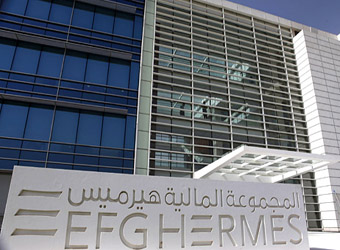EFG Hermes (HRHO.CA), the leading investment bank in the Arab world, maintained a sharp focus throughout the first half of 2013 on creating value for shareholders by growing its regional revenue base while simultaneously continuing to dispose of non-core assets and control expenses.
The firm released its consolidated results for the second quarter of 2013, in which EFG Hermes reported that Group revenues had grown 6% Y-o-Y. Although the firm’s ability to grow its revenues in Egypt was constrained given the extent of political and economic shocks felt in our home market of Egypt, the firm has recorded a reasonable uptick from growing regional business, which accounted for c. 77% of Group revenue in Q2/13. Regional conditions have resulted in certain impairment charges during the quarter, with a very limited impact on the firm’s healthy and highly liquid balance sheet.
The firm reported total consolidated operating revenues of EGP 506 million in Q2/13, with a net profit of EGP 81 million after taxes and before minority interest and impairment charges. These impairment charges relate to legacy investments resulted in a net loss after tax and before minority of EGP 29 million.
Cost-Cutting Plan
Management continues to implement an ambitious cost-cutting plan with the aim of reducing operating costs to c. EGP 500 million in 2014, assuming stability in the EGP:USD exchange rate.
EFG Hermes completed another round of employee reductions during the course of the second quarter to streamline operations through the combination of functions and the promotion of younger employees and enhance their responsibilities.
“This is very much in line with our longstanding policy of growing our staff base through promotion from within. The reduction in our headcount has been very difficult for everyone involved, but it has been necessary,” said Karim Awad, Co-CEO of Investment Bank at EFG Hermes. “Measures to reduce a multitude of other costs including occupancy, travel and administrative expenses — as well as generating yields from our idle real estate portfolio — are well underway and are expected to deliver clear benefits in the near future.”
Asset Disposal
Management is also firmly committed to its strategy, announced in May 2013, of shedding non-core assets and returning most of the proceeds to shareholders, all while maintaining a well-capitalized balance sheet.
“Our strategy regarding the disposal of non-core assets is in place,” noted Awad, “but its execution will be a function of market conditions, with timing based on our ongoing monitoring so that we execute at valuations that are accretive for our shareholders.
As part of that strategy, the firm has already finalized the sale of its former headquarters in Dokki, Giza, for a total consideration of EGP 38 million, which should generate a capital gain in the third quarter. Other options for non-core assets are currently being evaluated and will be communicated to the market in case of material developments.
Operational Highlights
“Operationally, our core divisions performed quite well in the second quarter even as political events in Egypt continue to weigh heavily on revenue generation,” Awad said. “Throughout the first half, the firm has maintained its strategy of growing its business in the Gulf to bridge the revenue gap in Egypt. This will remain our emphasis in the future, and we are simultaneously very mindful of opportunities to generate new fees through opportunities in Egypt.”
Key Operational Highlights
A significant volume pick up in Kuwait and the United Arab Emirates, which helped drive Securities Brokerage revenues during the course of the second quarter. The firm remains the top broker in Egypt by market share (excluding special transactions), although market volumes remain under pressure. The Securities Brokerage division is innovating not just to preserve its edge, but to grow. In the months ahead, the Brokerage team will be rolling out enhancements to its services for individual investors, while new developments in back-office systems will help the team better serve institutional and retail clients alike access six direct and six indirect markets.
The region’s number-one ranked Research house continues to produce some of the most in-depth quality pieces on which most market participants rely in their investment decisions. The Research team is emphasizing this year not the broadening of its market-leading coverage, but continued enhancement of its quality and the full exploitation of the Research Online portal launched last year.
Although regulatory approvals have delayed the booking of the related revenues, Investment Banking closed a major transaction in the UAE in the second quarter. The Investment Banking Division was also involved in a number of high-profile transactions that were not completed, including advising Vimpelcom on its attempt to acquire the free float in Orascom Telecom Holding (ORTE.CA). The Division’s ability to generate mandates in the UAE and Saudi Arabia has increased significantly as a result of enhanced pitching efforts. The team is building a compelling equity and M&A pipeline with a number of very interesting mandates across the MENA region as well as in Sub-Sahara Africa.
On the Asset Management front, the team continues to build on an outstanding 2012 that saw the division’s products lead the market in performance across most categories and geographies. The individual performances of most Asset Management funds and portfolios are among the best in the market in their respective classes. Worth noting is that changes in regulations governing money market funds in Egypt have negatively impacted this sub-segment of the market and, accordingly, the Division’s total AUM.
The Private Equity team remains on the lookout for new opportunities in infrastructure for the InfraMed fund. InfraMed is the largest investment vehicle dedicated to infrastructure investments in the SEMED region, which is advised by one of the Division’s wholly owned subsidiaries.
Finally, Crédit Libanais, EFG Hermes’ Commercial Banking arm, revenues rose in Q2/13 on the back of higher fees and commissions. Superior fee and commission growth came on the back of growth in both trade finance and insurance premiums in Lebanon.


